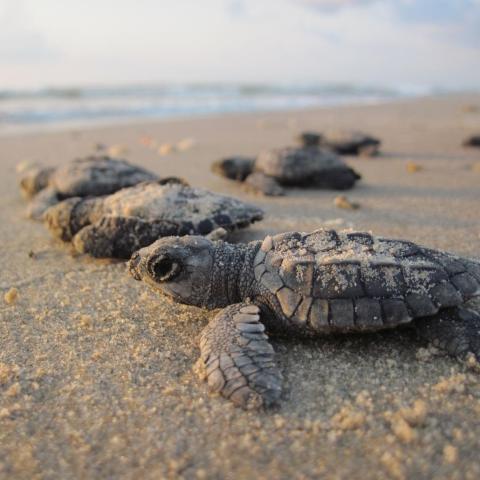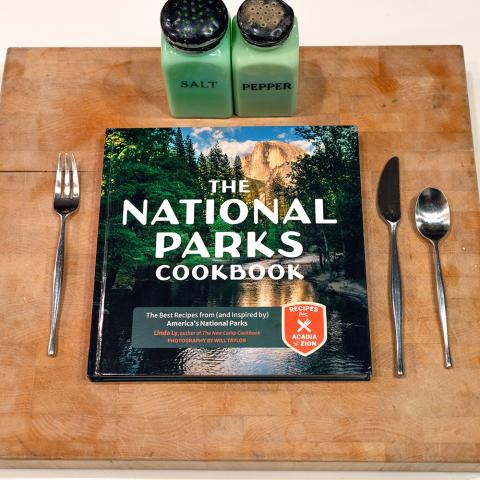
Interior Secretary Ryan Zinke wants the National Park Service to defer to states on wildlife and fisheries issues/NPS
Editor's note: This updates with reaction from the National Parks Conservation Association.
Though the National Park Service Organic Act of 1916 clearly directs the National Park Service to "conserve the scenery and the natural and historic objects and the wild life therein," Interior Secretary Ryan Zinke has directed the agencies under his purview to defer wildlife and fisheries matters to states.
In a memo (attached below) sent Monday, the secretary wrote that he "reaffirms" a 1983 policy that gives the states the authority "to exercise their broad trustee and police powers as stewards of the Nation's fish and wildlife species on public lands and waters under the jurisdiction of the Department."
National Park Service staff in Washington did not immediately respond to questions about the significance of the memorandum in light of the Organic Act.
Possible issues could arise in parks such as Yellowstone National Park, where the agency's management of bison has created conflicts with Montana interests; in Denali, Katmai, Wrangell-St. Elias and other units in Alaska, where the state has worked at times to reduce predators such as wolves to reduce their predation on moose and caribou, and; at Cape Hatteras National Seashore, where some have objected to the Park Service's management of threatened and endangered species such as sea turtles and piping plovers due to impacts on off-road vehicle access.
Already Secretary Zinke has pushed the Park Service to relax its hunting and trapping guidelines on national preserves in Alaska to bring them in line with state regulations.
"State governments have established fish and wildlife agencies that are charged with the responsibility and mandate to implement those statutes ensuring effective, appropriate, and efficient conservation and management of fish and resident wildlife species, including providing citizens wtih the opportunity to enjoy those fish and wildlife species through regulated hunting, fishing, and trapping," wrote Secretary Zinke.
"Moreover, State governments have consistenly demonstrated their commitment to sustaining fish and wildlife resources in perpetuity for the benefit of both current and future citizens," he added. "To that end, State governments have taken extensive measures to protect and conserve rare fish and wildlife species, including invertebrate species, and through the actions of State governments, they have sought additional funding to strengthen their capacity to implement strategies at a landscape level."
In light of that, the secretary continued, those agencies under him in Interior must within 45 days "complete a review of all regulations, policies, and guidance that pertains to the conservation and management of fish and wildlife species on lands and waters under their jurisdiction that are more restrictive than otherwise applicable State provisions..."
At the Coalition to Protect America's National Parks, Mike Murray said federal agencies have the authority to manage wildlife and fisheries.
"As with most of Secretary Zinke’s big pronouncements, this latest memo bears watching by anyone concerned about the management of the National Park System," he said in an email. "The memo appears to be a very selective reading of federal regulations found in 43 CFR Part 24. The Secretary has conveniently overlooked some of the core principles described in the regulations, most likely because those principles do not support his political agenda.
"For example, portions of the Secretary’s memo are at odds with the 'General jurisdictional principles' that are so clearly described in 43 CFR §24.3 and have guided NPS decisions related to hunting since 1983," Murray went on. "It is well established that federal land management agencies such as the National Park Service have both the authority and an affirmative responsibility to establish regulations that restrict or prohibit on federal lands state-authorized hunting practices that are in conflict with federal statutes, regulations, and management policies. A proper review by the respective agencies should confirm this to be the case."
Mark Wenzler, senior vice president of conservation programs for the National Parks Conservation Association, pointed to the Organic Act's guidelines in criticizing the secretary's order.
“For more than 100 years, the National Park System has benefitted from Congressionally-mandated protections to ‘conserve… the wildlife therein and … leave them unimpaired for the enjoyment of future generations," he said. "As noted in Secretary Zinke’s memo, Department of the Interior regulations acknowledge the role of states in managing wildlife, ‘except as otherwise required by Federal law.’ Wildlife in national parks is managed under federal law, including the National Park Service Organic Act. As such, Secretary Zinke should clarify that wildlife management for our national parks will not be affected by this directive.
“National Parks Conservation Association already has serious concerns about Secretary Zinke’s actions against wildlife on national park lands. In Alaska, Secretary Zinke’s 2017 directive to the Park Service to revisit commonsense sport hunting regulations now has the agency considering allowing sport hunting practices such grizzly bear baiting and hunting hibernating black bears on national park lands," he continued. "Our national park wildlife and the millions of visitors who travel to parks each year to see them benefit from a longstanding directive of preservation, and Secretary Zinke’s latest memo regarding state control must not alter those safeguards.”
Within 90 days, Secretary Zinke went on in his memo, the agencies must report to his deputy secretary "detailed recommendations" on how they would better align their fisheries and wildlife regulations with state provisions. After that, the deputy secretary will, after consulting with state wildlife agencies, report to Secretary Zinke a plan for bringing federal wildlife regulations in line with state regulations.




 Support Essential Coverage of Essential Places
Support Essential Coverage of Essential Places







Comments
There's gonna be a lot of work to be done when sanity finally returns to America.
Fish and Wildlife Service.
You can all go home today, full salary, since this one is on us.
Voting in 2018 and 2020 has never been more critical...
Has this guy even heard of "Trust Resources of the United States of America"? How about our responsibilities to Tribes, and treaties?
No, but he's certainly very familiar with trump Resources of the United States of America and will do all he can to maximize them.
I'm to about Chapter 12 in Woodward's new book. Even if only half of it were true, it's horrifying. Be sure you read it as soon as you can.
Sanity has returned to America, now the bunny huggers and anti-hunters in the NPS will either follow the directive or find new jobs.
incorrect! now those opposed will be going to the courts